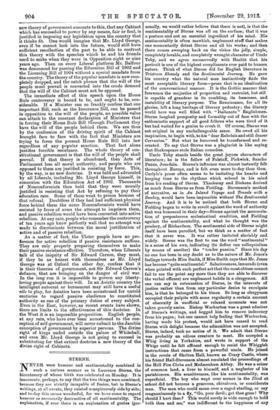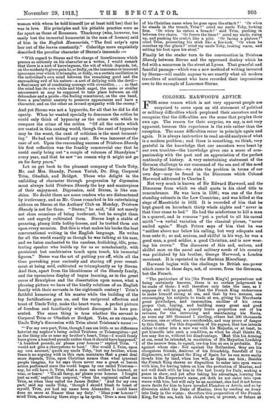STERNE.
NEVER were humour and sentimentality combined in such a curious manner as in Laurence Sterne, the bicentenary of whose birth was celebrated on Monday. It is inaccurate, perhaps, to say that the two things were combined, because they are strictly incapable of fusion, but in Sterne's writings, at all events, they existed conspicuously side by side; and to-day this seems wonderful, for we have come to regard humour as necessarily destructive of all sentimentality. The explanation, if ever there is an explanation of genius (per- sonally, we would rather believe that there is not), is that the sentimentality of Sterne was all on the surface; that it was a posture and not an essential ingredient of his mind. His sentimentality is often mawkish, unpleasant stuff that makes one momentarily detest Sterne and all his works ; and then there comes sweeping back on the vision the jolly, simple, completely lovable, and completely wrought character of Uncle Toby, and we agree unreservedly with Hazlitt that his portrait is one of the highest compliments ever paid to human nature. Think of what Sterne did for English literature in Tristram. Shandy and the Sentimental Journey. He gave his country what the natural man instinctively finds the most acceptable literary form—prose that is an idealisation of the conversational manner. It is the Gothic manner that forswears the majesties of proportion and restraint, but stil is capable of grandeur in its rambling, its looseness, and instability of literary purpose. The Renaissance, for all its glories, left a long heritage of literary pedantry; the literary world here was well filled with " Italianate " Englishmen. Sterne laughed pomposity and formality out of face with the enthusiastic support of all good fellows who were tired of it but had waited for a genius to crush it. Of course, Sterne was not original in any unchallengeable sense. He owed all his inspiration, to begin with, to his " dear Rabelais and still dearer Cervantes." But what he borrowed he transformed and re- created. To say that Sterne was a plagiarist is like saying that Shakespeare stole Italian comedies.
Uncle Toby stands beside the great joyous characters of literature ; he is the fellow of Falstaff, Pickwick, Sancho Panza, Jourdain. Sterne's influence was almost instantly felt throughout Europe, and is felt even more to-day than then. Carlyle's prose often seems to be imitating the knacks and keeping time to the rhythms which echoed in his mind from his reading of Sterne. Thackeray and Dickens derived as much from Sterne as from Fielding. Stevenson's method of narrative, as in An Inland Voyage and Travels with a Donkey, would have been impossible without The Sentimental Journey. And it is to be noticed that both Sterne and Fielding began to write in revolt against the word of authority that was honoured in their day—Sterne against the accumula- tion of preposterous ecclesiastical erudition, and Fielding against the sentimentality, and what be thought was the prudery, of Richardson. The sentimental side of Sterne might itself have been parodied, but we think as a matter of fact that it never was. It was rather imitated slavishly and widely. Sterne was the first to use the word "sentimental" in a sense of his own, indicating (to define one colloquialism by means of another) the "tender passion." Since his day no one has been in any doubt as to the nature of Mr. Jones's feelings towards Miss Smith, if Miss Smith says that Mr. Jones has become "quite sentimental." Salaciousness, innuendo (even when pointed with such perfect art that the most obtuse cannot fail to see the point any more than they are able to discover the verbal offence) are unpleasant habits in a clergyman. All one can say in extenuation of Sterne, in the interests of justice rather than from any particular desire to exculpate him, is that he belonged to his times. So long as clergymen occupied their pulpits with some regularity a certain amount of obscenity in unofficial or relaxed moments was not taken gravely amiss. Bishop Warburton was a great admirer of Sterne's writings, and begged him to remove indecency from his pages ; but one cannot help feeling that Warburton, having made his protest, would not have ceased to read Sterne with delight because the admonition was not accepted. Sterne, indeed, took no notice of it. We admit that Sterne was probably an odious creature to meet. He accepted a Whig living in Yorkshire, and wrote in support of the Whigs until he felt affluent enough to resist the Whiggish instructions that came from a powerful uncle. He joined in the revels of Skelton Hall, known as Crazy Castle, where his friend Hall-Stevenson almost emulated the proceedings of the Hell Fire Clubs and Medmenham Abbey. He was a seiner of common land, a liver to himself, and a neglecter of his parishioners. His sensitiveness, like his sentimentality, was superficial. The boy who wept over scenes in the Iliad at school did not become a generous, chivalrous, or considerate man. The man who could moan over a caged starling, or say magnanimously to a fly, "Go, poor devil; get thee gone! Why should I hurt thee ? This world surely is wide enough to hold both thee and me," was indifferent to the happiness of any woman with whom he told himself (or at least told her) that he was in love. His principles and his pitiable practice were as far apart as those of Rousseau. Thackeray (who, however, too easily lost the immortal humourist in the man of licence) said of him in the English Manicurists, "The foul satyr's eyes leer out of the leaves constantly." Coleridge more exquisitely described the peculiar character of Sterne's innuendo:—
"With regard to Sterne and the charge of licentiousness which presses so seriously on his character as a writer, I would remark that there is a sort of knowingness, the wit of which depends, 1st, on the modesty it gives pain to, or 2ndly, on the innocence or innocent ignorance over which it triumphs, or 3rdly, on a certain oscillation in the individual's own mind between the remaining good and the encroaching evil of his nature—a sort of dallying with the devil- s fluxionary art of combining courage with cowardice, . . . so that the mind has its own white and black angel, the same or similar amusement as may be supposed to take place between an old debauchee and a prude—the feeling resentment, on the one hand, from a prudential anxiety to preserve appearances and have a character, and on the other an inward sympathy with the enemy."
And yet Sterne was not a hypocrite, for all that he did he did openly. When he wanted specially to denounce the critics he could only think of hypocrisy as the crime with which to compare the crime of the critics. " Of all the cants which are canted in this canting world, though the cant of hypocrisy
may be the worst, the cant of criticism is the most torment- ing." He had not himself any cant. He was innocent of the cant of art. Upon the resounding success of Tristram Shandy his first reflection was the frankly commercial one that be could easily bring out "a couple of volumes of Shandyism"
every year, and that he saw " no reason why it might not go on for forty years."
Let us get back to the pleasant company of Uncle Toby, Mr. and Mrs. Shandy, Parson Yorick, Dr. Slop, Corporal Trim, Obadiah, and Bridget. Those who delight in the unfolding of character through progression by digression must always hold Tristram Shandy the key and masterpiece of their enjoyment. Digression, said Sterne, is like sun- shine. No doubt there are some readers who are disheartened by irrelevancy, and as Mr. Gosse remarked in his entertaining address on Sterne at the Authors' Club on Monday, Tristram Shandy is not for them. " Sterne," he said, "did not merely
not shun occasions of being irrelevant, but he sought them out and eagerly cultivated them. Sterne kept a stable of
prancing, plump little hobby-horses, and he trotted them out upon every occasion. But this is what makes his books the best conversational writing in the English language. He writes for all the world exactly as though he was talking at his ease, and we listen enchanted to the careless, frolicking, idle, pene- trating speaker who builds up for us so nonchalantly, with persistent but unobtrusive touch upon touch, his immortal figures." Never was the art of putting you off, while all the time provoking your curiosity and staving off your resent- ment at being sold, cultivated so triumphantly as by Sterne. And then, apart from the likeableness of the Shandy family, and the uproarious display of bogus learning, as in the great
curse of Ernulphus and the dissertation upon noses, what a pleasing picture we have of the kindly relations of an English family with their servants in the eighteenth century ! Trim's faithful humouring of his master while the building of the toy fortifications goes on, and the reciprocal affection and trust of Uncle Toby, make the heart warm. A perfect picture
of freedom and familiarity without disrespect is here pre- sented. The same thing is true whether the servant is Corporal Trim or Obadiah or Bridget. Take, as an example, Uncle Toby's discussion with Trim about Tristram's name :—
" For my own part, Trim, though I can see little or no difference betwixt my nephew's being called Tristram or Trismegistus—yet as the thing sits so near my brother's heart, Trim—I would freely have given a hundred pounds rather than it should have happened.' 'A hundred pounds, an' please your honour !' replied Trim. 'I would not give a cherrystone to boot." Nor would I, Trim, upon my own account,' quoth my uncle Toby, ' but my brother, whom there is no arguing with in this case, maintains that a great deal more depends, Trim, upon Christian names than what ignorant people imagine, for he says there never was a great or heroic action performed since the world began by one called Tristram— nay, he will have it, Trim, that a man can neither be learned, or wise, or brave.' "Tie all fancy, an' please your honour. I fought just as well,' replied the corporal, when the regiment called me Trim, as when they called me James Butler.' And for my own part,' said my uncle Toby, ` though I should blush to boast of myself, Trim, yet had my name been Alexander, I could have done no more at Namur than my duty.' Blesa your honour !' Cried Trim, advancing three_steps ay spoke, `Does a man think
of his Christian name when lie goes upon the attack ? "Or when he stands in the trench, Trim ? ' cried my uncle Toby, looking
firm. Or when he enters a breach ? ' said Trim, pushing in between two chairs. ' Or forces the lines ? ' cried my uncle, rising up, and pushing his crutch like a pike. Or facing a platoon ?' cried Trim, presenting his stick like a fire-lock. Or when he marches up the glacis ? ' cried my uncle Toby, looking warm, and setting his foot upon his stool."
Finally let the reader turn to the conversation in Tristram Shandy between Sterne and the oppressed donkey which he fed with a macaroon in the street at Lyons. That graceful and fanciful passage—which was a new method of writing invented by Sterne—will enable anyone to see exactly what all modern travellers of sentiment who have recorded their impressions owe to the example of Laurence Sterne.



















































 Previous page
Previous page